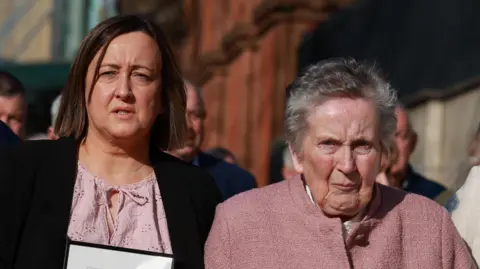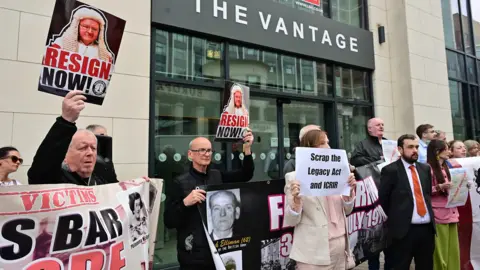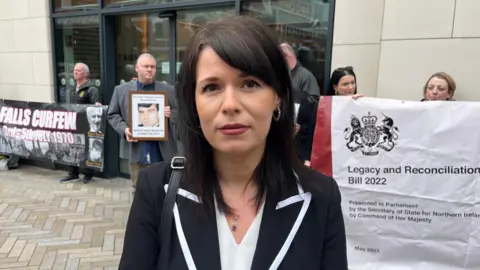'Disgraceful' government has disrespected family - Sean Brown's daughter
 PA Media
PA MediaThe daughter of a GAA official killed by loyalists has labelled the UK government as "disgraceful" for how it informed her family about its decision to challenge a court ruling over a public inquiry.
Siobhan Brown, whose father Sean Brown was abducted outside a GAA club and shot dead in 1997, said the government had treated the family with disrespect.
The Court of Appeal in Belfast had given Northern Ireland Secretary Hilary Benn four weeks to reconsider a decision not to hold an inquiry into Mr Brown's murder at the hands of the Loyalist Volunteer Force (LVF).
On Wednesday, Benn confirmed he was now seeking leave to appeal the judgement to the Supreme Court, the UK's highest court.
More than 25 people, including state agents, have been linked by intelligence material to the 61-year-old's death.
What did Sean Brown's daughter say?
Ms Brown told BBC Radio Ulster's Good Morning Ulster programme that the timing of Benn's announcement and the lack of information given to them beforehand had upset the family.
"We were distraught at the fact that this information had been released without the family knowing in entirety," she said.
"To suddenly hear it being broadcast, it's disgraceful."
Ms Brown added that "by the time I got home, I hadn't even reached my mother's house before the press were looking for quotes and statements.
"Meanwhile Hilary Benn had given a press conference in London," she said.
Ms Brown accused the government of treating her family with disrespect and of trying to undermine them.
She referred to her 87-year-old mother Bridie's appeal to Benn last month not to make her go to London to campaign for an inquiry.
"My mother made an impassioned plea to Hilary Benn, not to take her to London, that's fallen on deaf ears, that's the route we now have to go," Siobhan Brown added.
 PA Media
PA MediaSpeaking at Westminster on Wednesday, Benn said he remained determined to have a "full, thorough and independent investigation" into Mr Brown's murder.
"The murder of Sean Brown in 1997 was despicable, and his death caused great suffering and pain to his family, his wife Bridie and the community," he said.
"I know that the length of time it has taken to provide them with the answers they have been searching for has added to that pain."
Benn said while the government wanted an investigation that complied with its human rights obligations, the Court of Appeal's judgment required a "detailed and comprehensive response".
What have Northern Ireland politicians said?
Posting on X on Wednesday, First Minister Michelle O'Neill said that the government's decision was "cruel and inhumane" and called for it to "respect the court's decision and establish a public inquiry now".
Sinn Féin MP John Finucane said the government's decision to appeal the court ruling is "a continued affront to a grieving family".
"This is a family that has already waited 28 years," he said on Thursday.
"They've faced silence, secrecy and now delay disguised and wrapped up in legal process."
He said that the "only viable option" is a public inquiry.
"The so-called concerns cited by the British government have become a catch-all excuse to prevent transparency, even when the court themselves have demanded overwise, and it can't continue.
"The Brown family deserve answers and the public deserve the truth."
Legacy Act protest in Belfast
 Pacemaker
Pacemakerby Brendan Hughes, BBC News NI political reporter
Meanwhile, a protest was held outside the offices of a controversial legacy body in Belfast to mark a year since the Legacy Act came into effect.
Labour pledged to repeal the Legacy Act, which was introduced by the previous Conservative government, but it intends to retain the new body set up under the legislation - the Independent Commission for Reconciliation and Information Recovery (ICRIR).
A number of victims' groups have called for the ICRIR to be scrapped, arguing it is not sufficiently independent to investigate killings during the Troubles.
The protest, held on Thursday morning, was attended by victims and their families, and several organisations representing them.
Gráinne Teggart, deputy director of Amnesty International in Northern Ireland, described the Legacy Act as a "guillotine on truth".
She said victims' families did not see the ICRIR as a "credible alternative" for investigating Troubles legacy issues.
"Root and branch reform is needed but so too is gaining the confidence of victims," she added.
"Any legacy mechanism and the success of that will depend on it having that confidence from the victims community and as we can see from today, the legacy body under the act doesn't have that."

What happened to Sean Brown?
Mr Brown was locking the gates of GAA club Bellaghy Wolfe Tones when he was kidnapped by the LVF.
Early last year, a court heard more than 25 people, including state agents, had been linked by intelligence material to Mr Brown's murder.
In March 2024, a coroner said Mr Brown's inquest could not continue due to material being withheld on the grounds of national security.
He decided that redactions of intelligence material meant he could not properly investigate the circumstances of the killing.
Instead, he wrote to the then Northern Ireland Secretary Chris Heaton-Harris, requesting a public inquiry into the case.
In December, the High Court ruled that current Northern Ireland Secretary Hilary Benn must set up a public inquiry into the murder.
The government then appealed against that ruling, mounting a legal challenge to the Court of Appeal.
However, Lady Chief Justice Dame Siobhan Keegan said it was "a shocking state of affairs" that more than 25 years had passed but there had been no "lawful inquiry into the circumstances" of Mr Brown's death.
After that ruling, Mr Brown's family said Benn should "do the right thing".
Mr Brown's widow spoke directly to the NI secretary, saying: "Five judges have told you what to do, do the right thing and please don't have me going to London."
